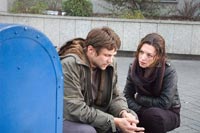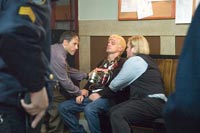What exactly do a police psychologist and a seminary student share in common? Why, they’re both haunted by their pasts and targeted by a serial killer with a penchant for explosives. At least that’s the case in Thr3e, the best-selling novel from Christian author Ted Dekker and now a motion picture—the latest theatrical release from the Fox Faith division of 20th Century Fox.
We’re first introduced to psychologist Jennifer Peters (Justine Wadell), whose own recent book has drawn the wrath of RK (short for the Riddle Killer). You know the type from other movies—a shadowy psycho who speaks via cell phone using an electronically scrambled voice, toying with victims through half-baked riddles and clues that can potentially spare them from a seemingly limitless supply of explosives. Unable to solve a riddle in time, Jennifer ends up losing her brother to one of the mad bomber’s schemes in the opening scene.

Three months later, we meet Kevin Parson (Marc Blucas from TV’s Buffy the Vampire Slayer), a bright seminary student struggling to finish his thesis on time—and of course, the subject would have to be The Nature of Evil. After a cell phone call, a riddle, and a car bomb, it would seem that Kevin is the next target, with the mad bomber demanding a confession from him for some past sin.
But what secret haunts the good-natured student’s past that would threaten his life, and how does it relate to RK’s previous killings? That’s up to Kevin to figure out with the assistance of Jennifer and the police, as well as Samantha (Laura Jordan), a childhood friend of Kevin’s. Together they uncover the bomber’s riddle-traps, each one gradually leading us to the surprising truth of RK’s true identity.
The good news is that Thr3e is not as bad as last year’s The Visitation, director Robby Henson’s previous film credit. This movie generally shows improvement in visual style, going for the same creepiness that underlies David Fincher’s Se7en, or at least your average direct-to-video release and made-for-cable thriller. Unlike most “Christian films,” Thre3e has the appearance of a credible cinematic release.
Also, thanks to Dekker’s sensibilities in the source material, there’s little in the way of objectionable content. No bad language and no gratuitous sex—Kevin and Samantha are portrayed as chaste friends, and frankly, Kevin doesn’t have time for romance in this movie. There are plenty of explosions and action intensity, plus someone does get shot in the leg, all worthy of a PG-13 rating. But it’s still tamer than most action dramas on television.

Offensive and excessive content obviously aren’t necessary to make a good movie, but a good script and good acting are—and they’re noticeably lacking here.
Shortly into Thr3e, you half expect a likeably formulaic story about a sem student and a cop who track down a murderer, using the Bible to solve riddles, save the day, and learn some deep spiritual lessons in the process. That’s only true in part, because once Samantha is introduced, the story focuses more on her and Kevin trying to save the day. Jennifer becomes more of a supporting character, which is surprising considering that she’s established as more important early on.
But along the way, for no clear discernable reason, Kevin develops a strong mistrust for the police. This is but one of his many irrational decisions. Rather than play it safe by avoiding RK’s riddles, Kevin plays directly into the bomber’s hand by placing himself in peril every time, resulting in one last-second-leap-before-the-explosion after another.
My favorite is the scene where Samantha finds herself locked in a holding cell with a bomb about to go off outside the door. Kevin runs in armed with a pistol, and he could easily just shoot the lock to free her. But no, our hero instead tries to pursue the killer, who seems to be intentionally leading him into another trap. He drops the keys to the cell on the floor of a dark room before running off into the night. Kevin searches in vain for them and then runs back for a flashlight … only to use it to try and disarm the bomb on his own. (Maybe he minored in Bomb Disarmament at the seminary?)

Meanwhile Samantha, also armed with a gun, figures out she can shoot the lock herself. She does and, get this—the two leap away from the explosion at the last second (for like the third time in the film).
For a thriller like Thr3e to work, the riddles need to make sense to create scenes of suspense that the characters (and audiences) can legitimately work out. But the riddles in this movie are almost tangential, with characters making guesses to stumble on the solution. Gosh, if I’ve learned anything from movies with bombs, it’s not to push buttons or cut wires haphazardly.
The script’s pacing and development is much more problematic. In attempt to be mysterious, characters are introduced as poorly as I’ve ever seen. Samantha comes virtually out of nowhere to Kevin’s apartment, despite not seeing him for years. In talking to him, she alludes to dealing with criminals and cops in her line of work. Later we learn she’s an insurance investigator, though later still we find she carries a gun. Who is this girl, and do all State Farm employees pack heat?
Far more (unintentionally) laughable is Kevin’s background. Fifteen minutes into the film, we meet the family that he left behind years ago. Problem is, we’ve no idea who they are—Kevin simply arrives at a house where three crazy people reside and they start berating him. We can only assume they’re family by the way he interacts, and it’s not until later that we learn they’re his Aunt Belinda, Uncle Eugene, and Cousin Bob. And they’re as loony as an insane asylum, like a non-violent version of the family from The Texas Chainsaw Massacre. No wonder he left.

As far as acting goes, Blucas comes off okay as Kevin, but is that because he’s the most high profile actor of the cast, or because everyone else is so bad? Most of the characterizations are merely flat and uninteresting, though Priscilla Barnes (from TV’s Three’s Company years ago) is unbelievably awful with an over-the-top portrayal of Aunt Belinda—a ridiculous cross between Cruella De Vil from 101 Dalmatians and Patsy Stone from Absolutely Fabulous. We have a winner for the Razzies.
But worst is the handling of the story’s surprise-twist ending, which I dare not give away here, but it’s one that’s been used far more effectively in other films over the last ten years. It also probably plays better on the printed page in this case, because visuals are far more powerful in providing the audience with facts and details that we assume to be true, only to have them contradicted later. Thr3e simply does not play fair when it comes to the mystery, and though it tries to explain some of the film’s previous scenes, it cannot possibly explain them all.
I also wonder if Christian moviegoers will be disappointed to find that the movie isn’t all that spiritual. Is it a “Christian movie” because the main character is a sem student, because characters use Romans 6:23 to solve a riddle, or because one character uses a sentence in a tacked-on conversation at the end to note how we all need God in our lives to reconcile the good and evil within us? Those are the extent of the overtly Christian qualities in Thr3e. You might be able to interpret more if you choose to, but then you may as well check out mainstream films like Children of Men, Pan’s Labyrinth, Rocky Balboa, and Little Children for their subtle spiritual messages. Frankly, I saw this as a cleaner than average action thriller, nothing more.
It used to be that Christian films couldn’t compete because of quality, but nowadays we’re finding that they share more in common with the average Hollywood film—style over substance. Thr3e looks like it should work on paper, as fans of the book will attest. But a shaky narrative, clumsy storytelling, and unintentionally campy acting make this a frustrating movie-going experience that’s only worth half the stars of its title.
Talk About It
Discussion starters- The killer in this movie seems intent on having Kevin repent of his past sins. Can we as Christians escape from our sinful nature? How are we saved?
- After Kevin confesses, RK suggests it’s still not enough. Is confession enough when it comes to sin, or are we still accountable for the consequences of sin? To what extent? What role did Jesus play in our accountability to the consequences of sin?
- The central theme of the movie seems to be about the nature of good and evil within each of us. Are we all capable of the same kind of good and evil? How do we reconcile this inner conflict? (See Romans 7:21-25.)
- Kevin’s Aunt Belinda explains to Jennifer how they insulate themselves from the world. Is it possible to overly insulate ourselves from the world around us? To what extent should we as Christians be involved with the world? What does it mean to be “in the world, not of it?”
The Family Corner
For parents to considerThr3e is justifiably rated PG-13 for its intense style and continuous sense of terror, with characters regularly threatened by an unseen killer. There are lots of explosions, and while a couple of characters die, no one’s really killed onscreen. The extent of the film’s violence involves flashbacks to an abusive childhood, including a bully threatening a teen, and someone who gets shot in the leg. There’s no objective language, though the bully repeatedly refers to the teen as a “puke.” It’s a relatively “clean” film, but not recommended for kids under 13.
Photos © Copyright 20th Century Fox
Copyright © 2007 Christianity Today. Click for reprint information.
What Other Critics Are Saying
compiled by Jeffrey Overstreet from Film Forum, 01/11/07There’s a lot of enthusiasm in Christian media today about the new surge of “Christian filmmaking.” But there’s a problem. Most of those faith-oriented films are getting bad reviews, even from Christian film reviewers.
In the case of Thr3e, the new thriller about a serial killer based on a novel by Ted Dekker, Christian film critics are wasting no words about the film’s shoddy quality. Sure, it’s important that a movie’s message be excellent. But is God glorified by mediocre craftsmanship and lousy storytelling? And what if the film’s redeeming elements are buried by the film’s darker elements?
Cliff Vaughn (Ethics Daily) isn’t just disappointed. He’s frustrated. “It bothers me, and it should bother you too, that out of all the movies that could have been made with a couple million dollars, Thr3e was chosen. This alleged psychological thriller … is so derivative as to be pointless. … We’re supposed to care about a theme of confession planted in the movie, but the characters, like the plot, have been so derived from standard Hollywood fare that we don’t recognize life—just other, better movies.”
Jeremy Lees and Steven Isaac (Plugged In) are impressed … with what isn’t in the movie. They liked “how the film tries to dispense with the over-the-top gore, profanity, sexuality and preternatural decadence so prevalent onscreen these days any time ‘horror’ or ‘suspense’ even begins to enter the filmmakers’ vocabulary.” But what do they think of what is in the movie? They say that “one could easily view this movie as a standard indie thriller, missing entirely the author’s and director’s oft-stated attempts to convey a Christian worldview.”
Lisa Rice (Crosswalk) criticizes it as “sometimes confusing,” frowns on “bad casting,” and says, “The sparse, tacked on faith elements seem like an afterthought, and it is doubtful whether audiences will truly come away with greater faith or a greater knowledge of God and His ways …” But she does calls it “a cleverly-written psychological thriller with a fun twist at the end …”
Mainstream critics give it thr3e thumbs down, declaring it to be “r3ally, r3ally aw4ul.” But the best cutesy quote comes from Frank Swietek (One Guy’s Opinion): “Thr3e isn’t even half the movie Se7en was.”
from Film Forum, 01/25/07David DiCerto (Catholic News Service) calls it “a conventional thriller, and not a very good one at that. … Despite a twist ending that deciphers the title, the movie’s flat writing, competent but colorless performances and overall made-for-TV vibe generate only low-grade suspense.”












